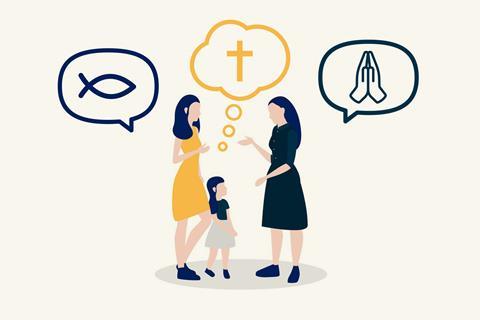Kate Orson unexpectedly stumbled across a way of building faith in her children

When it comes to teaching our children about God we might think about more formal methods of teaching like Sunday school or youth groups. But I’ve been surprised just how much my daughter has picked up simply from listening to my conversations with other Christian parents.
Through my relationships with other Christian parents, she’s learnt in a relaxed way in the home environment where she’s free to come and go, to play with other children or pets, without the need to sit still or pay attention. As a believer living in Italy, going to the nearest evangelical church is a over a half day round trip, so I don’t attend weekly, and my daughter rarely comes.
One thing that’s helped me in my faith is meeting regularly with other Christians, for coffee, lunch or a chat. It’s been an added bonus to find friends with children my daughter’s own age. I’ve also found that it’s in these relaxed meetings with other Christian families that the conversation can flow in an informal way that facilitates learning.
These gatherings are not about having a formal conversation, or serious ‘faith-talk.’ What I’ve found works best, is just to meet up with other Christian friends, and let the conversation guide itself. If we put God at the centre of our life and connect with other families doing the same it would be impossible for him not to be part of the conversation!
Perhaps a friend is talking about a personal challenge, and there’s a scripture that springs to mind to share with them, or maybe we are talking about our thoughts on the theory of evolution, and what the Bible says about how the world was created.
What is wonderful about this ‘listening in’ approach, is it respects a child’s free will. Sometimes children’s experience of Sunday school may be that it resembles school, and that there isn’t much choice or individualised attention involved. When we think of how Jesus invited people to follow him, it was always a choice.
While we must train up our children in the way they should go, a more organic approach can allow children to learn without feeling forced. If a child gets bored and wants to play in the garden they can. If they are feeling shy, they can stay close to their parents, and be part of the conversation even if it is just ‘passively.’ But in reality there’s nothing passive about a child’s listening.
Getting children to listen to instructions is one of the biggest parenting challenges parents face. Yet ironically, when they choose to listen, their ears are well-attuned to pick up everything! Many children enjoy listening into adult conversations, it’s how they learn about the grown-up world and how things work. As they get older their curiosity may increase, as they want to learn more. Out in the world, there’s less and less talk about God, which is why I think it’s so important we cultivate relationships with other Christian families.
Peer-pressure is a powerful thing, and as children grow older the roar of the world only gets louder. As humans we crave connection more than anything, connection to God and connection to each other. Creating an environment where children can connect to other Christian kids can help to prevent them seeking connection in the wrong places.
Perhaps there is another family at church with children of a similar age. Or someone at your child’s school who you know is a Christian too. Parenting can be isolating, and many parents would welcome a coffee or new connection with someone like-minded.
Jesus said that ‘where two or three are gathered in my name, there am I among them.’ (Matthew 18:19-20). I think this is such an important scripture to bear in mind, and it’s what I remind myself of, when I can’t get to church. Church can be two friends talking about God, while having a cup of tea. It’s not a replacement for the wider community that happens when we meet in groups, but I do think it’s an important supplement.
I’m careful to keep my conversation age-appropriate if there are children listening in. But I’m also aware that the darker side of faith such as the devil or spiritual warfare can actually be really interesting for them. Older children might love to hear about good arguments for the existence or faith, or how films and books might have messages that go against the Christian faith. Some of the things we think may be more ‘adult’ may actually be what gets children curious. I always check in with children or parents, if I’m not sure.
One thing I think is really important about these kinds of gatherings is that they are natural without any kind of agenda. If all that happens is your children jump on the trampoline together and ignore the adults completely then this is not a failure. It’s building relationships that may be the foundation of deepening their faith for years to come.










































